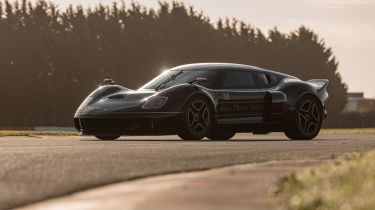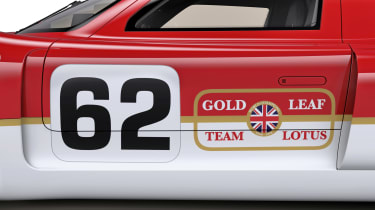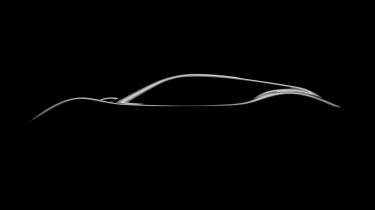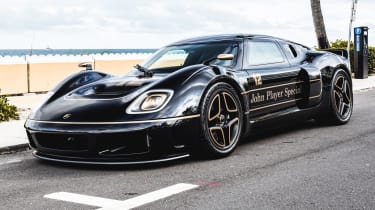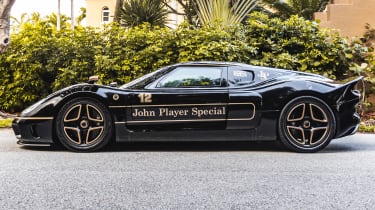Radford Type 62-2 will make dynamic debut at Goodwood
Festival of Speed visitors will be able to see retro-designed Radford Type 62-2 drive up the famous hill
Radford completed testing of its Type 62-2 sports car in late 2021 and now it’s ready to make its dynamic debut at this year’s Goodwood Festival of Speed, with Formula One legend Jenson Button at the helm.
The Radford Type 62-2 is an homage to the Lotus Type 62 racer from 1969 and has been tested at Lotus’s headquarters in Hethel, Norfolk. Only 62 examples of the Type 62-2 will be built and each will be customised to suit its owner’s taste - Radford says each car will be unique thanks to the level of personalisation on offer.
Jenson Button is one of the reborn coachbuilding company’s three main investors and has been integral to the car’s development phase. He spoke on the Type 62-2’s debut, saying “Goodwood Festival of Speed is a fantastic event, and I am looking forward to showcasing the driving capabilities and performance of our updated and refined Type 62-2 on the iconic hillclimb.
“This is an exciting opportunity for both motoring and motorsport fans, and I can’t wait to reveal all of the engineering changes we have made to the car as they come from F1-inspired pedigree.”
Three variants of the Type 62-2 will be available. The flagship John Player Special variant features a 600bhp supercharged 3.5-litre V6 petrol engine from Lotus and a seven-speed dual-clutch gearbox. Radford says that’s enough for a 0–62mph time of 2.9 seconds and an electronically limited top speed of 186mph.
Underneath that there’s a further two specifications, called Classic and Gold Leaf. The cheaper Classic variant has a 430bhp version of the same 3.5-litre V6 and a six-speed manual gearbox – and, as such, it’s marketed as the purists option.
The Type 62-2 Gold Leaf wears the same iconic red-and-white livery as Graham Hill’s 1968 Lotus Type 49B Formula One racer. To back up the racy looks, it also gets a more potent 500bhp version of the Lotus V6, and a seven-speed dual-clutch gearbox.
Button commented on his development drive last year: “To finally drive the type 62-2 for the first time was obviously a very special moment, the cockpit already feels like home! The car felt great, well-balanced in high and low-speed corners and ran faultlessly all day which is the perfect base for the months of setup tweaking that will follow for me. We want to ensure that this car is a pure driver’s car that pays both due respects to the DNA of Lotus but also delivers the luxury of a Radford.”
New Radford Type 62-2: chassis and setup
The Type 62-2 uses a Lotus chassis, although Radford has made a few changes to suit both the car’s styling and increased performance. It uses the same bonded aluminium structure as the outgoing Lotus Elise and Exige, and features a new body that’s made from carbon fibre composites. The cabin is also supported by a new carbon fibre crash structure that incorporates a roll-over hoop and strengthening for the firewall and windscreen.
All of this lightweight engineering means the Type 62-2 tips the scales at around 1,000kg – meaning even the least powerful model has a good enough power-to-weight ratio to keep up with the current crop of supercars.
There’s also a custom-made tubular rear subframe, which Radford says improves the car’s rigidity and cornering performance. However, it serves an aesthetic purpose too, because it’s visible from certain angles when viewing the car from the rear.
The Type 62-2’s underside is completely flat, and is designed to channel air towards the rear diffuser to generate downforce. That means the Classic variant can get away without using a spoiler, while the faster versions need only a pair of small ducktails.
The chassis setup also differs slightly according to the model. The cheapest Classic variant comes with staggered alloy wheels measuring 17 inches up front and 18 inches at the rear, while the car sits on adjustable suspension and Michelin Pilot Sport Cup 2 tyres.
Braking is handled by a set of four-pot AP racing callipers and iron discs, while the rear end is kept in check by an electronic stability programme designed by Bosch.
The 500bhp Gold Leaf variant gets lighter two-piece forged aluminium wheels, which are an inch larger in diameter on each axle, as well as a motorsport-derived traction control and ABS system that has been calibrated with the help of Jenson Button.
To reliably deal with the extra performance, the Gold Leaf’s engine also gets a few upgrades such as stronger con-rods, new pistons, more aggressive camshafts and a remapped ECU. Every version also comes with a titanium exhaust system.
Radford’s range-topping JPS variant has the same chassis setup as the Gold Leaf, but with even lighter carbon composite wheels, monobloc callipers and carbon-ceramic brake discs. There’ll also be a larger rear diffuser and front splitter to generate more downforce.
New Radford Type 62-2: design and interior
Our most recent update from Radford gave us our first look at the car’s interior. Like the rest of the car’s styling, Radford says the car’s cabin takes inspiration from the original Lotus Type 62 racer from 1969, with the slimline three-spoke steering wheel and feet-up driving position being the most obvious nods to the past.
The analogue clock and stopwatch being mounted on the passenger-side of the dashboard (a bit like they would have been in an old road racing car) is another design touch from yesteryear, and the gauges themselves are rather special because they’re made by the British luxury watch brand Bremont.
Ahead of the driver, there’s a carbon fibre steering wheel and a digital instrument panel. It’s flanked by two screens on either side of the dashboard that take images from the two cameras mounted on the car’s front wings, replacing conventional side mirrors.
This seems strangely high tech given everything else in the cabin is operated using traditional toggle switches, and Radford has even designed an exposed linkage for the manual gear stick.
The Radford coachbuilding firm was brought back from the dead, thanks to fresh investment from Jenson Button, TV personality Ant Anstead and designer Mark Stubbs.
Mark Stubbs commented on the design of the Type 62-2’s cabin, saying: “I always ask myself, what would Harold have done? Radford embraces and amplifies what the original manufacturer would do. We build up on it.
“We’ve got the same milled and turned finish from the body of the clocks in our switches, so we’ve really integrated them and embraced what Bremont has crafted into this design. The analogue displays are a beautiful homage to the era of the Type 62-2 and its heritage. We want the driver to feel 100% focused on the joy of driving.”
At least on the outside, though, there are plenty of similarities between Radford’s Type 62-2 and the original Lotus racer, including in dimensions: it stands just 1,133mm tall. In profile the car looks near-identical to the Lotus original, right down to the doors, which are both high-waisted and cut into the roof panel.
The sports car’s LED headlights have been designed to look like those found on the classic Lotus, although Radford has added a modern touch at the rear with a connecting LED bar between the two clusters.
Radford is also adamant that its clients will be able to use the Type 62-2 every day. Buyers can spec an optional nose lift system to allow the car to get over speed bumps, along with a custom luggage set from Mason and Sons, which slots under the front clamshell.
Radford will work with each customer on the design of their car, allowing them to pick upholstery finishes, paint colours and even make physical changes to the car’s bodywork with bolt-on aerodynamic components. The bespoke nature of each vehicle means that there is no publicly available price.
Now check out our insider story on one of the UK’s leading coachbuilders, David Brown Automotive…
Find a car with the experts

